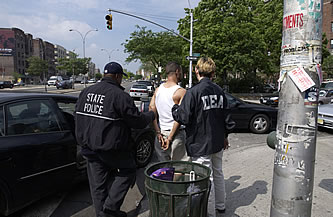List of wars on concepts
It has been suggested that this article be merged into War as metaphor. (Discuss) Proposed since June 2012. |
This article has multiple issues. Please help improve it or discuss these issues on the talk page. (Learn how and when to remove these template messages)
No issues specified. Please specify issues, or remove this template. |
Wars on concepts are high-resource efforts to eradicate a perceived problem that use a war metaphor to rally support. These wars differ from more conventional wars in that they do not have a defined country or person as the opponent, but rather a concept. Thus, it is impossible for the opponent to surrender, so it is possible to continue investment forever.
The War on Cancer
U.S. President Richard Nixon offered the phrase "War on Cancer" in 1971 to highlight the passage of the National Cancer Act, which attempted to unify efforts to treat and eventually eliminate cancer.
The War on Christmas
Although a close variant of the term "War on Christmas" is believed to have first been coined by British American journalist Peter Brimelow in 1999, the concept of a "war on Christmas" only entered the public consciousness in the United States and Canada during the early-to-mid-2000s, mainly due to an exposure of the issue by American commentator Bill O`Reilly.
It was claimed by Brimelow, O'Reilly, and a variety of prominent media figures and regular citizens alike, that mention and celebration of the Christmas holiday was being increasingly censored, avoided, or discouraged by advertisers, retailers, government (prominently schools), and other public and secular organizations.
Rather than referencing "Christmas" directly, it was claimed that the secular entities and influences would reference more generic terminology such as "holiday(s)", or "winter". Several terms fitting this description have since become well-known neologisms throughout North America, including "holiday tree" (replacing "Christmas tree"), "winter break" (replacing "Christmas break"), and "holiday season" (replacing "Christmas season").
The War on Drugs

The "War on Drugs" is a term used by many politicians, notably U.S. Presidents Richard Nixon and Ronald Reagan, to describe funding for anti-drug efforts, both in terms of law enforcement and social programs. The War on Drugs helped justify actual wars such as Operation Just Cause, the U.S. invasion of Panama in 1989. In the U.S. federal government, the leader of this effort is often referred to as the Drug Czar.
The War on Poverty
United States President Lyndon B. Johnson invoked the phrase "The War on Poverty" during his State of the Union address on January 8, 1964. With a national poverty rate just under 20 percent, the War on Poverty proposed massive governmental social programs to reduce that number to a tolerable amount. The resultant legislation was the Economic Opportunity Act, which established the Office of Economic Opportunity (OEO) to administrate the local application of federal funds The phrase was also famously mentioned in Tupac Shakur's Grammy-nominated 1998 song "Changes" with the line "Instead of War on Poverty/They got a War on Drugs so police can bother me".
The War on Terrorism
The phrase "War on Terrorism" (or "War on Terror") was invoked by President George W. Bush in the wake of the September 11, 2001 attacks against the United States. It describes a large array of military and law enforcement programs involving at least two actual wars (the current war in Afghanistan and the Second Gulf War) and the USA PATRIOT Act's increase of police and federal powers against people suspected of terrorist involvement.
The War on Terrorism is sometimes linked to a suggested War against Islam, a perceived campaign to hinder the activities of those who practice the Muslim faith.
The War on Violence
During the first quarter of 2012 the phrase "War on Violence" was coined by Secretary-General of the UN Ban Ki-moon as a way of bringing peace to the entire world. By aggressively fighting violence, wherever it occurs, people can freely assemble, dissemble, and reassemble without fear. Unlike other "Wars on Concepts," the War on Violence has a certain and obtainable outcome. World Peace.
The War on Gangs
This section needs expansion. You can help by adding to it. (April 2012) |
Other uses of the phrasing
- The War on Crime, the campaign in the 1930s by J. Edgar Hoover's Federal Bureau of Investigation against gangsters.
- War on Want is an anti-poverty charity based in Great Britain.
- The concept is parodied in the Australian comedy series The Chaser's War on Everything.
- Outfoxed: Rupert Murdoch's War on Journalism is a documentary film critical of Fox News Channel.
- The Republican War on Science is a book which argues that the Republican Party is playing politics with science.
- The War on Democracy is a documentary film critical of U.S. policies in Latin America.
- War on War is a 2002 single by the American band Wilco from their album Yankee Hotel Foxtrot.
- War on Liquids refers to the ban and limitations on liquids and gels on commercial airline flights by the United States Transportation Security Administration.
- The War on the War on Drugs is a 2002 anti-propaganda propaganda documentary that uses satire and the propagandist style to poke fun at certain absurdities in old anti-drug films.
- "The War On Cars" is a phrase coined by in 2010 by Toronto mayor Rob Ford, who also popularized the "war on graffiti."
References
- ^ Colombian Drug and Money Laundering Ring Shattered US Drug Enforcement Administration press release, June 14, 2005
